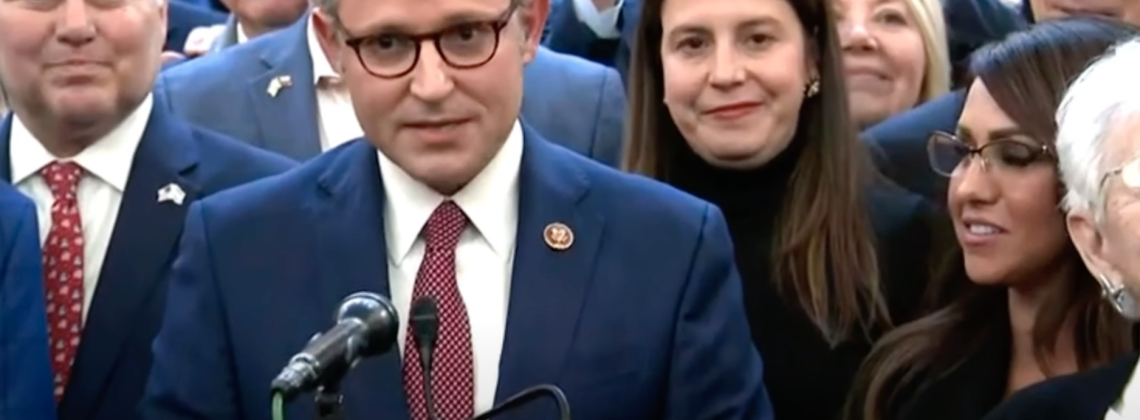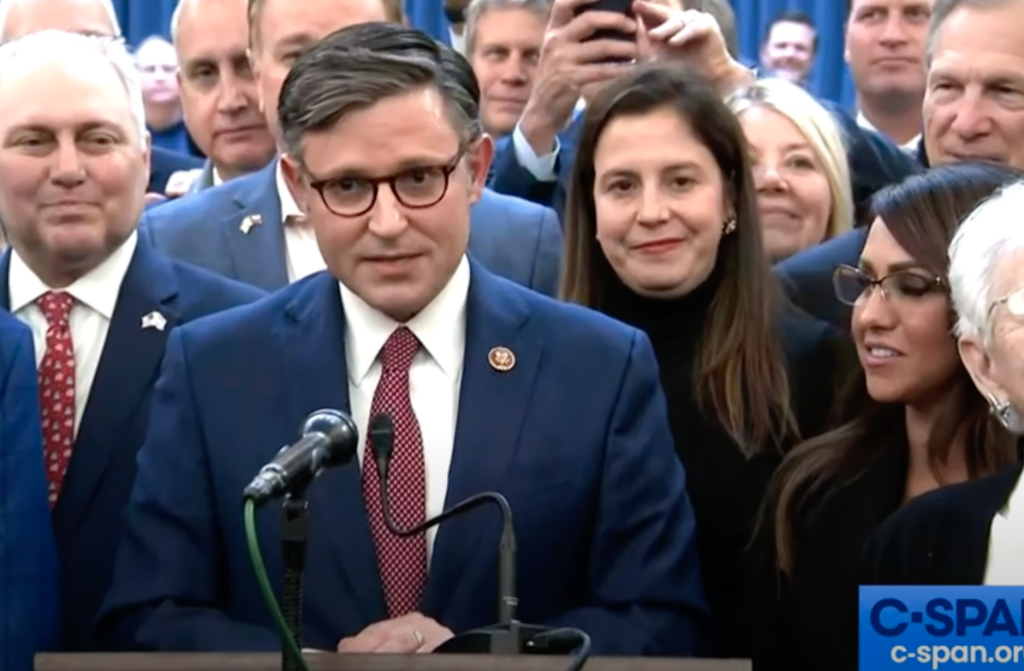

The new speaker of the House has strong ties to the Christian Right
After removing Kevin McCarthy as speaker of the House earlier this month, the House Republican caucus descended into chaos. Steve Scalise and Tom Emmer were not conservative enough for the right-wing of the Freedom Caucus. Jim Jordan was a bomb-thrower who could not win over GOP moderates. The entire messy affair, which kept the House closed for nearly three weeks, was an embarrassment for the Republican Party and the nation.
Yesterday, weary from trying to unify their deeply divided caucus, the GOP settled on Mike Johnson of Louisiana’s 4th District. Johnson is the 56th Speaker of the House. There was not a dissenting GOP vote.
Johnson accepted the speakership with humility and grace. He was extolled by some on the House floor as a “servant leader.” Even some of the Democrats stood during his acceptance speech.
Johnson is no flame-thrower. But we should not be fooled by his aw-shucks style. He is a culture warrior with deep connections to the Christian Right. One might call him a happy warrior.
I’ve been following Johnson’s career for a few years now. He is, in many ways, a traditional Christian Right moral crusader. He has received awards from the Family Research Council (he calls the council’s president Tony Perkins, a fellow Louisianian, “an old friend”) and the Louisiana Family Forum (which presented him with a Patrick Henry statue emblazoned with the words “Give me liberty or give me death.”) He spent most of his career as a religious liberty lawyer, fighting on behalf of conservative evangelicals who wanted to pray in school or stop the LGBTQ agenda. One might compare him to Donald Trump’s impeachment lawyer Jay Sekulow or Liberty Counsel’s Mat Staver.
Johnson has been a regular op-ed writer in his local newspaper, The Shreveport Times, railing against the usual stuff—pornography, gambling, abortion, and Louisiana Democrats. In a September 3, 2005 piece he blamed the looting in New Orleans following hurricane Katrina on legalized gambling in the state, claiming that the practice bred “covetousness” that encouraged people to “go for ill-gotten gain.” The chaos following Katrina, he believed, stemmed from a “culture that increasingly denies God’s existence” and “fosters a sense of entitlement and victim mentality among the poor.”
Johnson is a committed Southern Baptist. He has attended First Baptist Church of Bossier City, a megachurch in the Conservative Baptist Network (CBN). The CBN wants to “change the direction” of the Southern Baptist Convention in a way that stops it from “seeking approval of the world . . . toward a joyful commitment to God’s Holy Word.” This group makes Albert Mohler, president of Southern Baptist Seminary and fellow culture warrior, look like a flaming liberal. Johnson’s pastor, Brad Jurkovich, is a member of the CBN steering committee, a group that includes former Arkansas governor Mike Huckabee, Tony Perkins, and Liberty University Standing for Freedom Center director Ryan Helfenbein.
Between 2004 and 2012, while working as a lawyer for the Alliance Defense Fund, Johnson served as a trustee of the Southern Baptist Convention’s Ethics and Religious liberty Commission, the public policy arm of the Convention run by Richard Land. He was the founding dean of Louisiana College’s short-lived Paul Pressler School of Law. Louisiana College (now Louisiana Christian University) spent over five million dollars on the school, but it failed to get accreditation. The law school did not enroll a single student and Johnson eventually resigned amidst an ongoing scandal surrounding the college’s president.
It is fair to call Mike Johnson a Christian nationalist. In a 2022 lecture at Louisiana Christian College he told students that “the foundations of the U.S. stem from God” and that our “unalienable rights are irrevocable because they were endowed by God Himself.” In a December 2021 speech at a gathering of Wallbuilders, the Christian nationalist institute run by David and Tim Barton, Johnson said that the organization “has had such a profound influence on me and my work and my life and everything I do.” He thanked Wallbuilders for equipping “the soldiers on the frontlines” in this “critical time for the country.” His “values,” he told the Wallbuilders crowd, “follow the model of our founding fathers . . . we were established as one nation under God.”
Upon his appointment as dean of the Paul Pressler School of Law, Johnson announced that the school “will emphasize the history and philosophy of the law, the original meaning of our Constitution and the important Judeo-Christian influences upon the American legal system.” He echoed these themes in yesterday’s acceptance speech.
Johnson was elected to the House in 2016. Prior to his election to the speakership he was the vice-chair of the GOP Republican Conference. Since arriving in Washington he has worked to repeal the Affordable Care Act, supported Trump’s Muslim ban, served on the legal team that defended Trump during his impeachment hearings, and voted to overturn the 2020 presidential election results—that last of which was enough to win over the election-deniers in the GOP Freedom Caucus and secure his speakership.
Johnson has little leadership experience. He has never had to negotiate with Joe Biden, Mitch McConnell, or Chuck Schumer. He recently voted against Kevin McCarthy’s stopgap spending bill, brokered with Democrats, to keep the government open. Now it is his responsibility to work with Democrats on a budget deal to reopen the government for the rest of the year. He also voted against aid to Ukraine. Now he presides over a House whose members are largely in favor of granting such aid.
Maybe it’s a good thing that Johnson is such a devout follower of God. He’s going to need all the help he can get.
John Fea is Executive Editor of Current
Great work, John! David Barton now controls the House and our Republic is in even more danger than before. It’s the scourge of the SBC…F. Graham, Huckabee, Perkins, Jeffress, Robertson…all SBC …support the man who Scripture clearly reveals to be an anti-Christ. The SBC was founded by vile racist tares and it’s still producing its treasonous fruit.
I am interested in whether Christian Nationalist is a viable category to be used for discussion of politicians. Maybe Current might be a potential venue for a discussion,
I have read half a dozen books on Christian Nationalism in one way or another. Some of them are more careful than others. But there is clearly some conflation between Christian Nationalism and conservative Protestantism—the line between the two ranges from blurry to non-existent. And I think the other factor is that some (like Andrew Whitehead) want to keep defining Christian Nationalism as a label that some Christians lean toward, while others, like Michael Emerson, want to label it as a different religion. And then there are just the different ways that sociologists like Emerson and Whitehead use the term differently from historians or political scientists.
Micheal Wear, on his podcast and in some of his writing, tends to oppose the use of the term. His most recent podcast suggests that Michael Johnson is just a conservative Republican who has positions that are similar to what those in the Reagan era would have considered mainstream.
Adam: Great points all around. I used the term in my book *Was America Founded as a Christian Nation* back in 2011 to describe anyone who believes that the United States was founded as a Christian nation. One might also add folks who use this historical argument to advance policy in the present–such as David Barton. I only use the term to describe this group. Most of the sociologists, theologians, and political scientists who use the term have an axe to grind. I totally agree that folks seem to think that anyone who is pro-life or pro-traditional family or complementarian on gender or believes the founders thought religion was important to a healthy republic, or even a white evangelical is somehow a “Christian nationalist.” When pushed, they would back off such a claim, but when it comes to this discussion the conversation is woefully flat–very little complexity or nuance. I think Mike Johnson is an ideological Christian nationalist. In other words, he believes that the U.S. was founded as a Christian nation and needs to be reclaimed as such. We will see how this conviction shapes the way he governs. I think Wear is going to easy on Johnson. He and Reagan are very different in their approach.